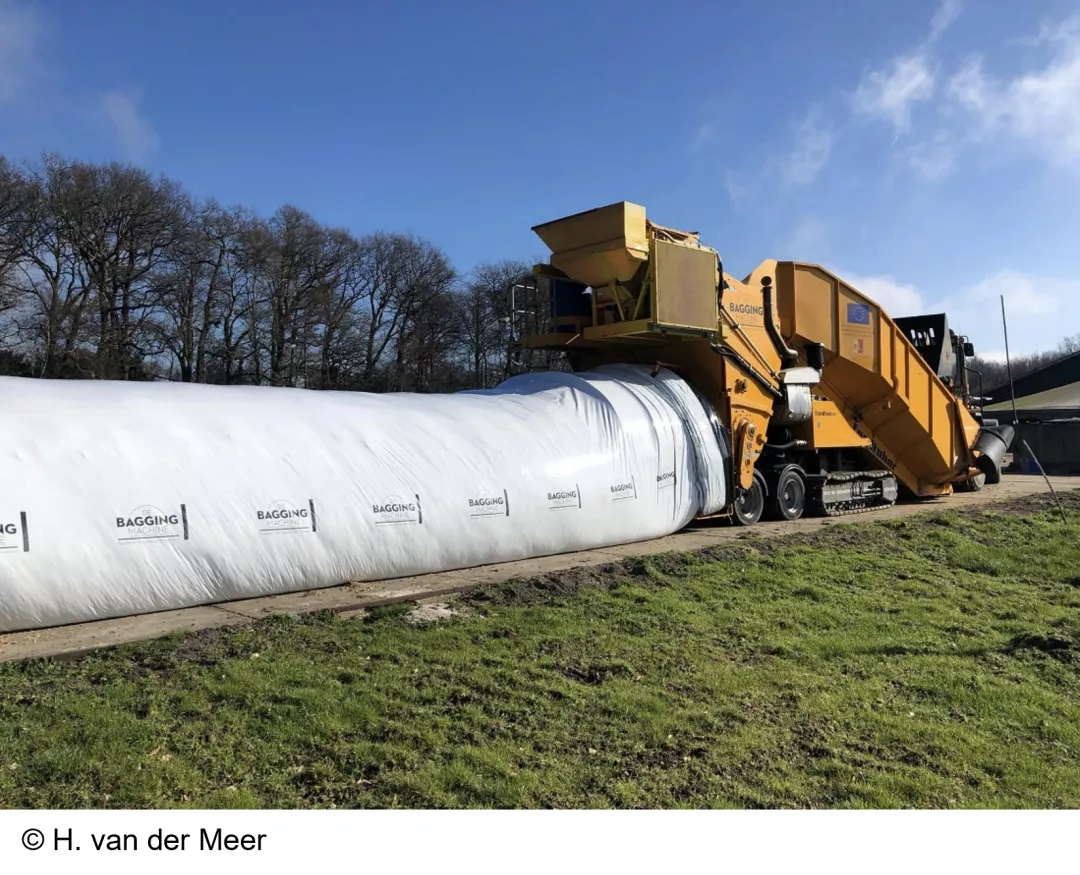General information
RDP Priority
- P2. Competitiveness
RDP Focus Area
- 2A: Farm’s performance, restructuring & modernisation
RDP Measure
- M04: Investments in physical assets
Summary
Nowadays, it is understood that increasing carbon in soils is a more sustainable way to improve soil fertility. Improving feed conservation on dairy farms and professionalising Bokashi production can make a significant contribution to sustainable agriculture. Using CAP investment support, a Dutch contracting company, HABO, purchased and developed a rotor tuber machine to secure cow feed and biomass in airtight bags. Bagging cow feed reduces the loss of nutrients and loss of feed. Bagging biomass waste allows it to ferment without emitting gas – a process called Bokashi – which produces a carbon rich soil improver.
Results
- The Bokashi produced by the new machine is now being used by farmers/clients to improve their soil.
- The project promoter achieved positive economic results; already breaking even in 2022. This shows that the CAP support had a positive impact on their business.
Promoter
HABO
Funding
Total budget 369 500.00 (EUR)
EAFRD 154 877.50 (EUR)
National/Regional 154 877.50 (EUR)
Private/own funds 59 745.00 (EUR)
Resources
Documents
EU CAP - Good Practice Report - Investing in a Rotor Tube Machine for Promoting Circular Economy in Agriculture
(PDF – 542.49 KB)
Context
Recent changes in Dutch legislation require additional efforts from farms to protect the country’s waterways. Dairy farms can make a positive contribution to this effort by minimising their nutrient pollution. Maintaining silage in the right conditions is an essential step in preventing nutrient leaks but also to avoid contamination of the cow feed and the growth of fungi.
The conventional way to improve soil fertility is to use chemical fertilisers. Nowadays, it is understood that increasing carbon in soils is a more sustainable way to improve soil fertility. This can be achieved by the anaerobic composting of remains from agriculture and forestry. The dry matter produced is called Bokashi.
A rotor tube is a machine that can press biomass and animal feed in a plastic trunk under high pressure. It can be used for both the production of silage and Bokashi. The compacted animal feed and biomass are kept under anaerobic conditions. This preserves the silage better and avoids nutrient leaks, while the biomass is composted much more effectively.
A Dutch agricultural contractor, HABO, which is based in Noordeloos, used CAP funds to invest in a rotor tube machine and improve the level of services that they can offer to local farmers.
Objectives
The aim of this project was to make a new service available to dairy farmers that would improve feed conservation; reduce nutrient leakage; and professionalise the production of Bokashi.
Activities
The purchase and modification of a rotor tube machine to enable the large-scale production of Bokashi.
In order to promote this service to farmers, two demonstrations were carried out to show the effectiveness of the improved machine.
Main results
-
Before this circular economy investment, biomass such as mowed grass from roadsides and coarse manure were often simply thrown away. The new rotor tube machine makes it possible to turn this previous waste quickly and efficiently into beneficial Bokashi.
-
The Bokashi produced by the new machine is now being used by farmers/clients to improve their soil.
-
The project promoter achieved positive economic results; already breaking even in 2022. This shows that the CAP support had a positive impact on their business.
Key lessons and recommendations
-
Circular economy approaches to the development of agri-food sectors can create multiple economic, social and environmental benefits for project promoters and the wider population of EU citizens.
-
Dutch laws and regulations pose limitations on the production of Bokashi because the process involves combining different materials together. Projects like this (which has contributed to embedding better standards of Bokashi production) as well as current research being undertaken by the Wageningen University & Research (examining the effects of Bokashi) complement each other in support of more sustainable agricultural practices.
